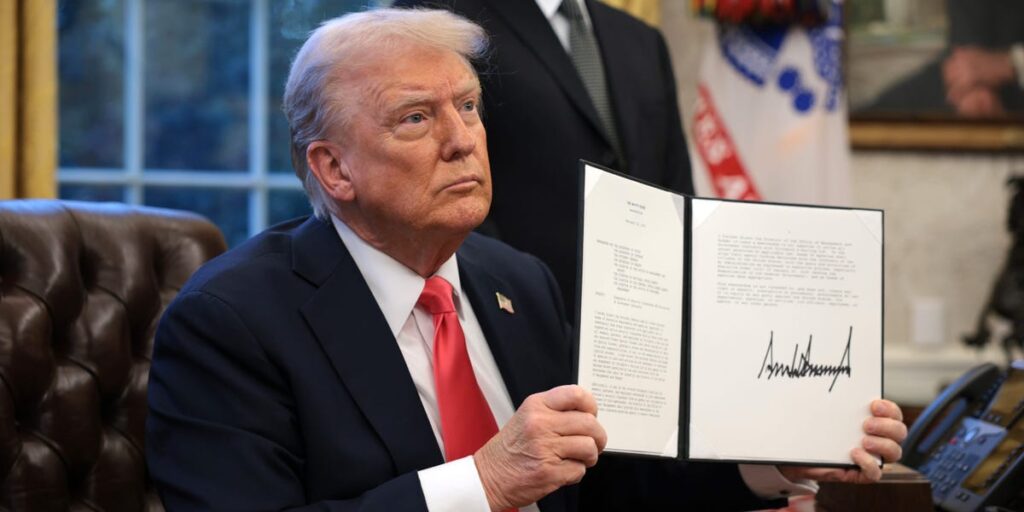As Donald Trump has targeted major law firms in recent weeks, the responses from various firms have been mixed. Some have chosen to make deals with the president, while others are staunchly resisting his pressure.
Trump’s sweeping executive orders have led to reviews of government contracts with these firms, resulting in canceled security clearances for certain employees and, in some instances, barring them from federal buildings, including courthouses.
Accusing Big Law firms such as Paul Weiss, Perkins Coie, and Covington & Burling of weaponizing the judicial system, Trump’s directives have complicated their operations. Several firms have filed lawsuits claiming that the executive orders aim to suppress free speech and discourage clients from associating with them. Conversely, other firms have opted to collaborate with the administration to sidestep punitive measures.
Among his specific targets, Trump has pointed out law firms he believes have wronged him, aided his political adversaries, or operated diversity initiatives contrary to his stance against such efforts.
Furthermore, Trump directed Attorney General Pam Bondi to identify firms involved in what he termed "frivolous" lawsuits against his administration, positioning them for potential retaliatory actions.
Here’s a look at several of the firms Trump is challenging, their responses, and the current status of legal proceedings for those fighting back:
Paul Weiss
On March 14, Trump issued an executive order aimed specifically at Paul Weiss, criticizing attorney Mark Pomerantz and what he deemed unlawful discrimination tied to the firm’s diversity, equity, and inclusion (DEI) policies. Pomerantz had previously left the firm to assist the Manhattan District Attorney’s investigation into Trump’s financial dealings. In that same order, Trump sought to remove security clearances and limit access to government buildings for Paul Weiss attorneys, potentially endangering the firm’s operations.
However, just days later, Trump rescinded the executive order after reaching an agreement with Paul Weiss chairman Brad Karp that included $40 million in pro bono work for causes aligned with the administration and a commitment to eliminate the firm’s DEI practices. Karp faced backlash from within the firm for not challenging Trump’s initial order more vigorously, as some individuals believed such compliance could jeopardize the firm’s future.
Perkins Coie
On March 6, Trump targeted Perkins Coie with another executive order that suspended security clearances for its attorneys and criticized its diversity initiatives. Trump highlighted the firm’s representation of Hillary Clinton during the 2016 campaign, labeling its actions as "dishonest and dangerous."
In response, Perkins Coie filed a lawsuit against the administration for actions it argued violated free speech and due process rights. The firm’s managing director stated that the order constituted an unlawful attack on clients’ rights to choose their counsel without fear of government retribution. A federal judge subsequently temporarily blocked part of Trump’s order.
Covington & Burling LLP
On February 25, Trump signed a memorandum suspending security clearances for employees at Covington & Burling, citing ties to former special counsel Jack Smith, who had previously pursued two federal cases against Trump. Covington responded by clarifying its representation of Smith was in an individual capacity, emphasizing its commitment to legal defense amid governmental scrutiny.
Skadden, Arps, Slate, Meagher & Flom LLP
Skadden preemptively made a deal with Trump, agreeing to provide $100 million in pro bono legal services, as well as committing to merit-based hiring and avoiding "illegal DEI discrimination." Although the agreement was presented as mutually beneficial, many within the firm expressed discontent, viewing it as a concession to Trump’s administration. This sentiment was echoed by associates who publicly resigned in protest.
Elias Law Group
Trump’s administration named Elias Law Group in a memo targeting supposedly "frivolous" lawsuits. Marc Elias, founding chair of the group, countered Trump’s claims by asserting that the attacks on his firm aimed to intimidate any legal practitioners willing to oppose the administration in court. Elias pledged that his firm would continue to fight for democracy without yielding to pressure from the White House.
Jenner & Block
On March 25, Trump issued an order revoking security clearances for Jenner & Block attorneys while reviewing the firm’s federal contracts. The order specifically targeted Andrew Weissmann, a former attorney at the firm known for his role in the Mueller investigation. Jenner & Block responded by labeling the order unconstitutional and challenging it through a lawsuit, ultimately obtaining a temporary restraining order against the administration’s actions.
WilmerHale
Trump signed an executive order on March 27 affecting WilmerHale, which included suspending security clearances and revoking government contracts due to alleged partisan activities. In contrast to firms that sought to negotiate, WilmerHale opted for legal action, hiring a notable attorney to combat the administration’s attempts to limit its operations. A federal judge granted a temporary restraining order against the executive actions, stating they posed a threat to free speech and legal advocacy.
Milbank
On April 2, Trump announced a preemptive agreement with Milbank, which committed to ending DEI hiring practices and pledged $100 million in pro bono work to support causes favored by the Trump administration. The firm expressed satisfaction with the agreement, viewing it as a means to mitigate uncertainties stemming from the administration’s actions.
Susman Godfrey
On April 9, an executive memorandum targeting Susman Godfrey accused the firm of attempting to manipulate the legal system. Trump’s order mandated the immediate suspension of the firm’s employees’ security clearances and the review of its hiring practices for compliance with civil rights laws.
Willkie Farr & Gallagher
Willkie Farr & Gallagher also struck a deal with Trump, pledging $100 million in pro bono services for conservative causes. The firm approached the administration itself, highlighting its commitment to ending what it termed the "Weaponization of the Justice System."
In summary, the legal landscape continues to evolve as Trump’s administration takes a hard line against certain law firms, prompting a range of responses from cooperation to outright legal challenges.


